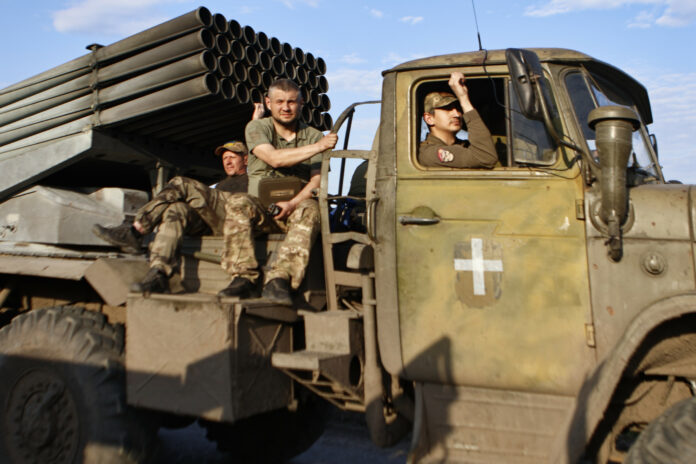It took more than nine months, more than 20,000 fatalities and a whole lot of ammunition, but it appears Russian forces have taken the small Ukrainian city of Bakhmut. The battle was the deadliest of the 15 month-long war by far and resembled the kind of grueling, artillery-laced duel you read about in history books. The entire affair was eerily reminiscent of World War I-style warfare, with young men jam-packed into deep trenches hoping not to be overrun by the enemy.
Just because the Russians control Bakhmut doesn’t mean the Ukrainian army is any less motivated to prosecute the war and boot every single Russian soldier off every square meter of Ukrainian territory. This event will have no bearing at all on whether Kyiv decides to launch a counteroffensive, nor will it necessarily prove to be a turning point for a Russian military whose campaign in riven by infighting and poor assumptions. Russia’s military troubles don’t end with the seizure of a strategically insignificant city.
Neither do NATO’s. While the transatlantic alliance’s problem-set are wholly different from Russia’s and far less urgent (NATO militaries, after all, aren’t sacrificing tens of thousands of their personnel or atrophying their defense capability in pursuit of questionable aims), the war has forced it to tackle the question of how to deter Russia and interact with a non-ally like Ukraine over the long-term. What is the best way to safeguard Ukraine’s territorial integrity while at the same preventing the war from escalating into a Russia-NATO clash that, theoretically, could involve the use of nuclear warheads?
There are considerable differences within NATO on this question. Currently, NATO policy is straightforward: ensure Ukraine has the military capacity to defend itself against Russian aggression and assist Kyiv as it seeks to accomplish its objective of expelling the Russian army.
Beyond this, though, NATO is still very much in the early stages of the process. The debate about whether to bring Ukraine into NATO has hovered over the alliance even before NATO heads of state gave the country a provisional “yes” more than 15 years ago. The Ukrainians want to get a move on; writing in Foreign Affairs last month. Ukrainian Foreign Minister Dmytro Kuleba argued that Ukraine has gone above and beyond when it comes to proving its worth to the alliance, “NATO should make a political decision to put forward a timetable for Ukraine’s accession.”
Ukraine has allies in its cause, particularly countries in Eastern Europe who have first-hand experience living under Soviet control during the Cold War. The Baltic States are making the case that NATO should offer Kyiv a membership action plan during its upcoming July summit in Vilnius, Lithuania, which would spell out the specific steps it needs to take to officially acquire membership. The only point of agreement, it seems, is that Ukraine’s incorporation into NATO is not on the agenda as long as the war with Russia continues. This isn’t a surprise; there is a long-standing NATO policy, dating to at least 1995, that countries aspiring to join NATO must first resolve their territorial disputes.
But let’s assume for the sake of argument that Ukraine’s counteroffensive plays out the way Ukrainian President Volodymyr Zelensky hopes it does: with a Russian defeat. Let’s assume that Russia withdraws all of its troops from Ukrainian territory, including Crimea, the strategic peninsula Moscow annexed in 2014 and has spent nearly a decade fortifying.
NATO will then have to deal with the Ukraine question one way or another. The alliance has three broad options at its disposal.
First, it can do what is most comfortable: settle for the status-quo. This would entail reiterating yet again that Ukraine will eventually become a NATO member at some undefined time in the future. Yet this basically kicks the can down the road and gives Ukraine more false hope to run on. In essence, it’s the equivalent of a parent promising their kid a puppy in the hope the conversation about getting a cute, furry friend goes away.
Yan Dobronosov/Global Images Ukraine via Getty Images
Second, it could offer Ukraine an action plan on the road to actual membership. In Norway’s case, such a process took about a year. Ukraine’s process could very well take longer. Either way, Ukraine would be on its way to becoming NATO’s 32nd member state.
Such an option comes with high risk. Granting Ukraine membership locks the entire alliance into defending Ukrainian territory from all threats, foreign and domestic, in perpetuity. Because the majority of NATO member states still won’t meet their defense spending obligations and have less-than-ideal capacity after decades of hollowing out their militaries, it’s highly likely the United States would be left doing most of the work. Ever more U.S. troops, equipment, and enablers would be placed in Europe at a time when shifting the security burden to European militaries should be U.S. policy. And while a defeated Russia would take years to rebuild militarily, there is always the chance that Moscow could re-launch hostilities in Ukraine at a time of its choosing, in which case the U.S. would be at war with the world’s largest nuclear power.
The third and least risky option would be for NATO to settle on an arrangement short of full membership for Ukraine but still sufficiently robust to boost Kyiv’s defenses. Some refer to this as turning Ukraine into a “porcupine” or providing Kyiv with the NATO-standard weapons systems, military technology, and training necessary to deter Russia from conducting another military campaign. If deterrence fails, then Ukraine would still have the formidable capacity to defeat another Russian attack without the risk of drawing NATO into a full-fledged war.
What path NATO chooses may ultimately determine Russia’s reaction, and with it, the possibility of more violence in Europe.
Daniel R. DePetris is a fellow at Defense Priorities and a syndicated foreign affairs columnist at the Chicago Tribune.
The views expressed in this article are the writer’s own.


